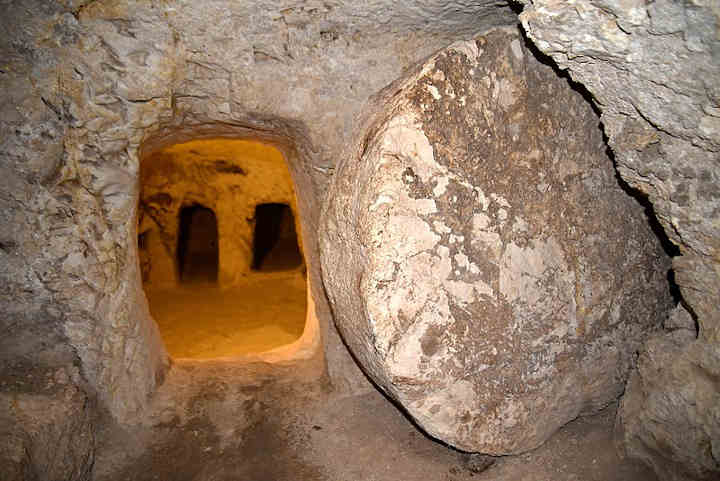In almost 60 years as a believer, I have had times of faith and confidence, and times of doubt and uncertainty. Most times it is a little of each.
To doubt is human. Thoughtful people question opinions and beliefs. Our brains are made that way. So whether we are a believer or unbeliever, we will sometimes wonder if we’ve got it right.
So why do I keep on believing in Jesus and trying to follow his teachings?
Where do I start?
Most of what we know about Jesus comes from the 4 gospels. Scholars have identified several sources that contributed to these biographies. These, together with references to Jesus in other documents from the first and early second centuries, give us about a dozen early and generally independent sources for the life of Jesus.
So historians, whether christian, other religion or no religion, all generally agree that Jesus was a real person, and the gospels tell us some real facts about him. This raises (for me) three questions:
- Should I care? Is this relevant to me?
- How much of the gospels are real facts?
- Can and should I believe in Jesus from the evidence they offer?
Here is my personal answer to those questions.
1. Is Jesus relevant today?
There is no contesting that Jesus is an influential person in world history. Christianity is the most followed religion in the world. Christians have had a big impact on the world, for good and evil. It can be plausibly argued that we wouldn’t have our modern western culture, ethics and values, without christianity. Modern science grew in a christian environment.
That doesn’t make christian belief true of course, but it does mean it can’t be ignored.
Christianity makes enormous claims. It says there is a God, and he offers eternal life to humans and a purposeful life here and now. Many people say following him has given great meaning and comfort in their lives.
And christianity is a religion built around forgiveness. God is willing to forgive us our foolishness, mistakes and selfishness, and he expects us to be forgiving of others. Imagine a world where that happened!
In risk management terms, the positive consequences of belief are so great that it is a great risk not to at least investigate the truth of Jesus.
So I conclude that if he told the truth, Jesus is indeed relevant today. But do we know what he said? And did he tell the truth?
2. How much of the gospels are real facts?
I can’t help feeling that we have to reject both extremes on this question.
The scholars tell us that the gospels are written as historical biographies, a genre which aimed to tell the story of a person’s life based on historical facts. A writer in this genre was permitted to be creative with minor details in the story, but the main facts had to be true.
The bare bones, at least, of the gospel outline of the life of Jesus, are confirmed by other sources. So there is no good reason to reject that outline as basically factual, as for example, New Testament scholar and non-believer Bart Ehrman makes clear.
So the gospels contain at least some historical facts, maybe a lot.
But there are anomalies and inconsistencies in the gospels. Some think they can all be satisfactorily explained, others think there are real doubts about the facts. But as it stands, these problems make it difficult to accept that the gospels are without error.
Do the problems prove the gospels are false?
I don’t think the apparent problems with the gospels are as big a deal as often made out. Even if we take out those parts historians find doubtful, there is still a good historical basis for these broad facts, as almost all historians agree:
- Jesus was a travelling rabbi or teacher, who lived in the early first century,
- his teaching that God was invading history through him, in order to began a new movement he called the kingdom or God, was radical, hopeful and life-changing,
- he was known as a healer and miracle worker, whose apparent miracles were unprecedented in the ancient world,
- he had followers (disciples) who lived closely with him and (with one exception) believed in him and his teachings and his divine authority, and continued to do so for the rest of their lives,
- he was executed by the occupying Roman authorities, but his followers believed they had seen him alive after he died.
The supernatural?
But can we believe in the miracles? It is possible to fool people into believing what they want to believe. Or to write miracles into a story long afterwards. Could either of these have happened?
The sheer number and variety of Jesus’ apparent miracles make it harder to think he could have fooled people into believing them. Too many people saw too many different amazing things. The disciples saw them up close, again and again. And too many people experienced remarkable healings and undoubtedly re-told the story over and over again.
And while we can see development in understanding from the earliest gospel (Mark) to the latest (John), and the inclusion of some apparently non-historical material, the gospels were written too close to the events for so many legendary stories of this nature to have been added. Historians are satisfied that the miracle stories were part of the accounts of Jesus’ life right from the beginning.
The resurrection is the hardest part of all, of course. Dead men don’t come back to life, do they?
Well not normally, but the whole point of the gospels is that Jesus wasn’t a “normal” man. It is hard to accept the resurrection, but it is hard to believe any of the alternatives too. Like the miracles, the resurrection was part of the Jesus story from the very beginning, so it wasn’t a later legend.
The most commonly suggested alternative is that Jesus’ followers were so distraught by his death, they suffered cognitive dissonance and experienced hallucinations, or had emotionally based visions of him. Some find this plausible, but I don’t. All of them?
In the end, I can’t rule out the supernatural in a story where God is said to be acting in human history. I come to the Jesus story with good reasons to believe that there is a God, whose creation explains the origin of this world and the design of the cosmic laws that against all natural probability provide the conditions for life to evolve. A God whose creation of the human race explains our consciousness, our ability to exercise free choice, and to express ourselves rationally, and the universal belief in an objectively true moral code.
So for me, unlikely as it is, the resurrection is believable, more believable than the alternatives of hallucination or fraud. And it’s appropriate too. For if Jesus really was acting on divine authority, then it seems quite right that God would raise him. it’s the right ending for the story of his life.
So how much can we rely on the writers?
So I don’t see any reason to distrust the writers. I can see no motive for them to falsify the story. Certainly, their lives would have been easier if they weren’t Jesus-followers.
And they were concerned to tell their story truthfully. Luke in particular seems meticulous in his gathering of facts – Maurice Casey (another historian who was not a believer) described Luke as “an outstanding historian by ancient standards”.
So I conclude that the gospel writers really believed that what they wrote was true. Jesus was a remarkable man who did remarkable things and made a strong impression on those who heard him. They or the people who shared their stories with the writers had spent large slabs of time with him, and his life rang true to his teachings.
They spoke the truth as they knew it. But did he tell the truth? Did he know the truth?
Did Jesus tell the truth about him and God?
I find it impossible to believe that Jesus was a charlatan.
Just as I can’t see how the gospel writers could have been writing what they didn’t believe, so I can’t see how Jesus didn’t believe in the truth of what he said. I read his sayings, I watch him relating to powerful people and social nobodies and I am impressed:
- He spoke against powerful people who abused their positions and treated the common people with disdain.
- He spoke up for the ostracised, the downtrodden and the poor.
- He treated women with far more respect and inclusion than was common in his day.
- His moral judgment often took truths already known and taught by the rabbis and sharpened them and applied them with insight and compassion.
- He freely offered forgiveness and acceptance to social outcasts and those whose choices had put them offside with the religious establishment.
- He kept this up even when he knew it would lead to his death.
Whatever else may be true, that man wasn’t being deceptive.
Only two alternatives seem feasible
All of this leads me to believe only two alternatives are possible.
Either he was sincere but mistaken …..
Some scholars see Jesus as another in a long line of apocalyptic teachers and prophets who saw the sorry state of captive Israel and believed it was his role to lead a peaceful revolution culminating in God’s decisive intervention into Jewish affairs, to free them from Roman rule.
His ethical teachings called Israel to a new standard in preparation for that coming age, when God would rule Israel and as his chosen people, they would rule the world to the benefit of all.
But, despite his sincerity, his force of character and his noble agenda, on this view he was mistaken. He was executed and it all came to nothing. But the disciples, led by the hyperactive Paul, reinvented Jesus’ teachings and began the christian religion.
That’s one alternative.
….. or he knew the truth and spoke it
He was this type of apocalyptic teacher and prophet, but he was more. He was son of God, the divine king coming to earth to establish God’s kingdom on earth. He was beginning a revolution of love and peace. He called his followers to live out those values and so demonstrate and participate in that kingdom.
He was executed, but that somehow wasn’t a setback, but the doorway to the new kingdom. God raised him to life to demonstrate that one day all would be raised.
He calls people to this day to join in the peaceful revolution, receive forgiveness and healing, and then offer the same to others. One day, everything will be put right.
That’s the other alternative.
My choice …..
So for me, despite doubts and uncertainties, it all adds up.
Believing in Jesus makes more sense of the facts than any other choice.
Following Jesus makes more sense of my life than any other choice.
The Jesus of much modern christianity (conservative, judgmental on unbelievers, uninterested in justice for the poor, supporting the status quo) isn’t believable to me. That Jesus doesn’t seem to be true to history. But the Jesus described by the gospels is eminently believable (to me) and worth following.
….. and yours
I hope these musings assist you in thinking through your own response. Please leave a comment or send an email if you have anything to say.
Graphic: Free Bible Images.





Really enjoyed this post. I find it truly meaningful and insightful when someone can express both doubt and faith, and proceed to analyse things with both in hand. I always feel stuck in between the two, in a kind of Robert Lawrence Kahn styled reluctant agnosticism .
Keep on sharing your thoughts, and stay healthy out there.
AJ from the UK
Hi Aaron, thanks again for your encouragement. I think claims of certainty (whether of belief or unbelief) are probably mostly overstatements, and recognising our uncertainty is only realistic. I think that’s true in most parts of life, but we learn to live with it and make decisions and live purposeful lives regardless. So I feel it makes sense to do the same with christian belief.
I am struck by your phrase “reluctant agnosticism”. It reminds me of a friend of mine who used to have a blog The Aspirational Agnostic, reflecting her journey from the atheism of her upbringing and younger life. She eventually embraced christianity, though she is a long way from a conventional christian. And accordingly she closed down the blog.
I will certainly be trying to have thoughts worth sharing! 🙂
Thanks for your reply!
I’ve given her blog a look, and have marked it for possible further reading. Obviously there several different types of agnostic. What I mean by reluctant agnostic is as follows:
I think deep down I want certainty. Certainty about the universe, why does it exist?, what am I? Do I have free will? If God really is as real as I am does he/she/it care about us? Will I ever see departed loved ones again? That type of thing ( which I think are very normal human questions to ask, I don’t think these questions I have are unique to me in any way, or any believe or non believe for that matter). At this point in my life ( I’m 27, Pushing 28) I’ve come to the conclusion that such certainty, in the the life we know at least, will never be held by me at least. No matter how much I wish I could. I can be certain of my sincere hope that there is a loving God, that no one is ever truly gone, that everything has meaning etc. But I don’t “know”. I equally respect the faithful (and by extension religion in general) and the doubters too much to simply attached myself to either one out of anxiety or my weird need to”know”. To do so would be dishonest in both cases, least at the moment. So I am agnostic by principal if not by conviction ( I really hope I’ve been coherent ?). All that said, the fact that the “smartest” of our beautiful little species has never reached a consensus on such questions does make me feel better.?
AJ
That’s interesting. I’m pretty sure she took that blog down several years ago now, yet I can see it too. I was thinking maybe it exists in some shadowy world of internet caches, but I was able to “like” a post which suggests it is still “live”. I’ll see if I can find what’s going on.
I sort of understand your agnosticism, not personally, but from some people your age who seem to be a little the same. I think maybe my generation was more happy to make a jump, whereas your generation is a little more cautious.
Do you think that is the case? Do you find yourself tending to agnosticism or uncertainty in other areas of life also?
Oh this agnostic approach is definitely extended to other spheres of life as well. For example, I’m not really sure where I would truly fall into the political spectrum. (I generally prefer to identify myself as centrist, which is a very broad term).
Ultimately I think you’ll find that my generation ( the Millennials) attitude towards religion is evolving. I’ve taken note that the anti religious or hardline atheists, like the new atheists who were at their peak during my generations formative years, seem to like to claim my generation as utter convinced against spirituality who will never return to organised religion. Personally, I think they’re jumping to wishful thinking. I know very few of my generation who would say they don’t believe in a higher power. Your usual answer is “I don’t know” and maybe ” I hope so”. You’ll find the likes of Richard Dawkins and Sam harris becoming increasingly unpopular due their increasingly bigoted and snobbish attitude…..among other things. I suspect our attitudes towards things such as religion and faith will continue to evolve. I can only speak for myself but I personally have already concluded there is no real conflict between science and religious belief as a concept, and that the atheism of the previous generation is nearly entirely based on ethical, political, and philosophical reasons as well as a reaction to the American right.
So I think we’ll find my generation will likely look at religion in a more decentralised way. But by a large we’re still in our “thinking” phase. I know I am ?.
I hope that makes sense.
Best regards
AJ
That was a really interesting and helpful comment thanks. I have observed this tendency to uncertainty in a number of good friends who are in their 20s. These people are christians, but have doubts and questions. Their issues are, I think, not dissimilar to what you describe – suspicious of much hardline christianity just as you say many Millennials are suspicious of hardline atheists.
I started this blog 16 years ago when it was much more fashionable for atheists and christians to argue, on forums, blogs and later facebook. I quickly decided I wasn’t interested in argument, just discussion, and I have always tried to make the blog open-minded and fair. But it began with more proof, logical argument and evidence content, and then I gradually developed more personal content (people’s stories, etc) because I recognised that different types of content appealed to different people.
You comments make me think I should (1) write a page or post on agnosticism, and (2) think about what content would be more likely to be interesting to people like you describe. I’d be interested in your comments about what sort of content would be most appealing.
Thanks.
Hi UnklE (Or would you prefer Eric?)
My sincerest apologies for the late reply. Haven’t had the time to check all my mail recently due to study and family commitments. To answer you question about content for my age group……
This is only an educated guess but I would suggest looking at the following concepts: Can someone who isn’t a part of an organised religion still consider themselves religious? Is being in the “Non-religious” category really the same as being considered an atheist? or does that just mean that person is not a part of an organised religion?
I think (From personal subjective experience) that a lot of Millennials reject what is traditionally described as organised religion as organisations, but do not reject the notion religiousness (God, human beings having a spiritual dimension etc). I think the general thought pattern is ” Why do I have to go through someone else to know God?” or “I feel like there is a loving God, but some of the organisations that claim to represent him want me to reject my LGBT family members for reasons that simply feel wrong to me. I could never reject the people I love, so does that mean I must reject religious belief?” or something along those lines (both those examples are of course, generalisations off of the top of my head).
This is what I meant earlier with the phrase “Decentralised religion”. Belief and faith that are not institutionalised or hierarchical but personal and egalitarian. I think such a concept would be very interesting to a lot of my generation.
So I would suggest perhaps exploring the notion of a more personalised religious life. If you yourself have experience of both private worship (Praying or reading scripture in your own home for example), and communal worship (Church, bible reading club etc), then perhaps (if you feel inclined) compare the two and then state your thoughts on the advantages and disadvantages of both. Is one better then the other? or are they at their best when in balance?
Those would be my personal suggestions. But of course I cannot speak for my generation as a whole, no one can. Non-the-less I hope this is useful to you.
My best wishes to you and yours
AJ from the UK
Hi Aaron, now it’s my turn to apologise. I am very busy and I saw your comment when it first came in but didn’t get back to it until now.
Thanks for your thoughts here. I am a somewhat “anti establishment” christian, so it would be easy for me to take up some of your ideas. I will put them on my list to think about and see what I can come up with. Thanks again.